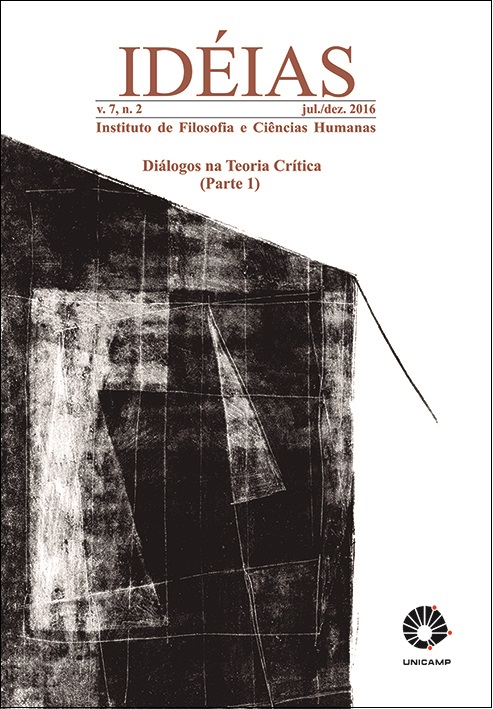Resumo
The paper reconstructs Axel Honneth's theoretical evolution as a complex interrogation of Habermasian critical theory, arguing against a misconception that Honneth tries to “supersede” Habermas' perspective through an essentialist and reductionist social philosophy, and pointing out that Honneth's theory retains a “Habermasian” tension between two imperatives: attaining post-metaphysical normative foundations and articulating a “diagnostic” social critique. The paper concludes that Honneth's recent works exhibit a systems-theoretic sensitivity, which suggests that Honneth's “dialogue” with Habermas continues.
Referências
ALEXANDER, J.; LARA, M. P. Honneth’s New Critical Theory of Recognition. New Left Review, 220, p. 126-136, 1996.
ANDERSON, J. Situating Axel Honneth in the Frankfurt School Tradition. In: PETHERBRIDGE, D. (ed.). Axel Honneth: Critical Essays. Leiden: Brill, 2011, p. 31-57.
v. d. BRINK, B; OWEN, D. (eds.). Recognition and Power: Axel Honneth and the Tradition of Critical Social Theory. Cambridge: Cambridge University Press, 2007.
COOK, D. Adorno, Habermas and the Search for a Rational Society. London: Routledge, 2004.
DERANTY, J-P. Beyond Communication: A Critical Study of Axel Honneth’s Social Philosophy. Leiden: Brill, 2009.
DERANTY, J-P. Critique of Political Economy and Contemporary Critical Theory: A Defense of Honneth’s Theory of Recognition. In: SCHMIDT AM BUSCH, H-C.; ZURN, C. F. (eds.). The Philosophy of Recognition: Historical and Contemporary Perspectives. Plymouth: Lexington Books, 2010, p. 285-317.
DERANTY, J-P. Reflective Critical Theory: A Systematic Reconstruction of Axel Honneth’s Social Philosophy. In: PETHERBRIDGE, D. (ed.). Axel Honneth: Critical Essays. Leiden: Brill, 2011, p. 59-88.
FRASER, N.; HONNETH, A. Redistribution or Recognition? A Political-Philosophical Exchange. London: Verso, 2003.
HABERMAS, J. The Theory of Communicative Action, vol. 1 (Reason and the Rationalization of Society). Transl. Thomas McCarthy. Boston: Beacon Press, 1984.
HABERMAS, J. The Theory of Communicative Action, vol. 2 (Lifeworld and System: A Critique of Functionalist Reason). Transl. Thomas McCarthy. Boston: Beacon Press, 1987.
HABERMAS, J. Postmetaphysical Thinking. Trans. William Mark Hohengarten. Cambridge, MA: The MIT Press, 1994.
BERG, T.; MIKLICH, T.; ZUCCA, D. Von Habermas zu Honneth – aber wohin? (I) and (II). In: HALBIG, C.; QUANTE, M. (eds.). Axel Honneth: Sozialphilosophie zwischen Kritik und Anerkennung. Münster: Münsteraner Vorlesungen zur Philosophie, 2004, p. 45-60.
HONNETH, A. Critique of Power: Reflective Stages in a Critical Social Theory. Transl. Kenneth Baynes. Cambridge, MA: The MIT Press, 1991.
HONNETH, A. The Fragmented World of the Social: Essays in Social and Political Philosophy. Transl. Mitchell G. Ash et al. Albany, NY: State University of New York Press, 1995.
HONNETH, A. The Struggle for Recognition: The Moral Grammar of Social Conflicts. Transl. Joel Anderson. Cambridge, MA: The MIT Press, 1996.
HONNETH, A. Unsichtbarkeit: Stationen einer Theorie der Intersubjektivität. Berlin: Suhrkamp Taschenbuch, 2003.
HONNETH, A. From Struggles for Recognition to a Plural Concept of Justice (Interview with Gwynn Markle). Acta Sociologica, vol. 47, n. 4, p. 383-391, 2004.
HONNETH, A. Gerechtigkeit und Kommunikative Freiheit: Überlegungen im Anschluss an Hegel. Critique & Humanism, 22, p. 19-33, 2006.
HONNETH, A. Disrespect: The Normative Foundations of Critical Theory. Transl. John Farrel et al. Cambridge: Polity Press, 2007a.
HONNETH, A. Recognition as Ideology. In: v. d. BRINK, B; OWEN, D. (eds.). Recognition and Power: Axel Honneth and the Tradition of Critical Social Theory. Cambridge: Cambridge University Press, 2007b, p. 323-347.
HONNETH, A. Reification: A New Look at an Old Idea. Transl. Joseph Ganahl. New York: Oxford University Press, 2008.
HONNETH, A. Pathologies of Reason: On the Legacy of Critical Theory. Transl. James Ingram. New York: Columbia University Press, 2009.
HONNETH, A. Das Ich im Wir: Studien zur Anerkennungstheorie. Berlin: Suhrkamp Taschenbuch, 2010a.
HONNETH, A. The Pathologies of Individual Freedom: Hegel’s Social Theory. Transl. Ladislaus Löb. Princeton, NJ: Princeton Monographs in Philosophy, 2010b.
HONNETH, A. Das Recht der Freiheit: Grundriss einer demokratischen Sittlichkeit. Berlin: Suhrkamp, 2011a.
HONNETH, A. Rejoinder. In: PETHERBRIDGE, D. (ed.). Axel Honneth: Critical Essays. Transl. Joseph Ganahl. Leiden: Brill, 2011b, p. 391-421.
MARKELL, P. The Potential and the Actual: Mead, Honneth and the I. In: v. d. BRINK, B; OWEN, D. (eds.). Recognition and Power: Axel Honneth and the Tradition of Critical Social Theory. Cambridge: Cambridge University Press, 2007, p. 100-132.
MCNAY, L. Against Recognition. Cambridge: Polity Press, 2008.
RENAULT, E. The Theory of Recognition and Critique of Institutions. In: PETHERBRIDGE, D. (ed.). Axel Honneth: Critical Essays. Leiden: Brill, 2011, p. 207-231.
ZURN, C. F. Introduction. In: SCHMIDT AM BUSCH, H-C.; ZURN, C. F. (eds.). The Philosophy of Recognition: Historical and Contemporary Perspectives. Plymouth: Lexington Books, 2010, p. 1-19.
A Idéias utiliza a licença do Creative Commons (CC), preservando assim, a integridade dos artigos em ambiente de acesso aberto.

